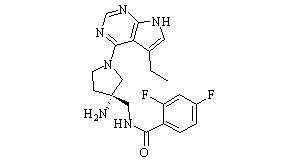AKT inhibitor
| CAS No. | 1004990-28-6 | Cat. No. | BCP16893 |
| Name | AKT inhibitor | ||
| Synonyms | AKT protein kinase inhibitor; | ||
| Formula | C20H22F2N6O | M. Wt | 400.43 |
| Description | In vitro: AKT inhibitor binds deeply into the active pocket of PKBα, creating favorably hydrophobic interactions with more residues than that with PKA.[1] AKT inhibitor achieves 900-fold selectivity for Akt over PKA, presumably because of the increased steric demand of the ethyl core substituent being better tolerated in Akt than in PKA. AKT inhibitor is chosen as the most promising molecule to advance to clinical development. in vivo: AKT inhibitor is well absorbed (F = 54%) in dog pharmacokinetic studies (oral at 2 mg/kg, iv at 1.2 mg/kg), with moderate clearance (11.6 mL/min/kg) and volume of distribution (4.8 L/kg), and a half-life of 4.4 h. AKT inhibitor is subsequently evaluated for modulation of Akt in tumors53 and in multiple in vivo mouse models of antitumor efficacy. AKT inhibitor is active in a PC3 prostate carcinoma xenograft experiment, with 75% TGI observed at 100 mg/kg b.i.d. dosing for 10 days. In a colorectal carcinoma (Colo205) xenograft study, AKT inhibitor produces | ||
| Pathways | PI3K/Akt/mTOR | ||
| Targets | AKT | ||
Structure

Part data of this page collected from the open network resources, so Biochempartner can not guarantee its accuracy.
For product details of different batches, please contact our Customer
- Service & Tech Support:orders@biochempartner.com
- Website:www.biochempartner.com
Products are for research use only and not for human use. We do not sell to patients.
